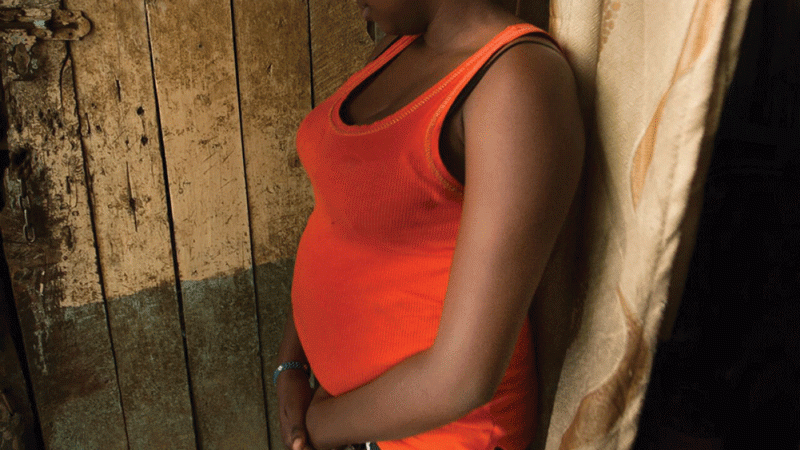
Corrupt workers at Zimbabwe’s major public hospitals such as the Parirenyatwa Group of Hospitals in Harare and United Bulawayo Hospitals in Bulawayo are facilitating illegal and unsafe abortions, investigations have revealed.
Nurses and other staffers are charging between US$150 and US$200 for these procedures, using unconventional pills that are not approved by the Medicines Control Authority of Zimbabwe.
The practice is growing at alarming levels, with many young women, including girls below the age of 18, terminating pregnancies.
Truth Diggers found that most women are getting the drugs and other illicit means from nurses at public hospitals.
Truth Diggers is the investigation arm of Alpha Media Holdings, which publishes The Standard, Zimbabwe Independent and NewsDay.
Zimbabwe's legal framework governing abortion is highly restrictive, and the penalties for illegal abortion can be severe.
However, the stringent laws have significant implications for women's health and access to safe abortion services.
Many women resort to unsafe methods due to the restrictive legal environment, leading to health risks and legal consequences.
- Hospitals face acute staff shortage
- ‘Blood, drug shortages hit UBH’
- Man fatally assaulted over touting
- Byo vendors, council clash over vending bays
Keep Reading
Experts say dangers of unsafe abortions include severe complications, infections, and even death.
Long-term health consequences can be severe and enduring, including chronic reproductive issues and infertility.
Data on abortion practices in Zimbabwe is scarce, but studies suggest that unsafe abortions are a serious issue.
According to the Zimbabwe Maternal and Neonatal Health Survey, approximately 60% of women seeking abortions in Zimbabwe may resort to unsafe methods due to limited access to safe services.
A University of Zimbabwe student, who terminated a two-month old pregnancy last year, has a harrowing tale to tell.
Her uterus had to be removed after she had developed severe infection and she can no longer have children.
“I was introduced to a male nurse who assured me the procedure was safe and it would happen overnight,” said the student, who requested to remain anonymous.
“He assured me that it would be like a heavy period and we would be done with it. He said if any complications arose he would be a phone call away.
“My married boyfriend paid US$150 for pills that I inserted into my privates.
“I went to a friend’s house to do it. Suddenly, I experienced debilitating cramps and I thought I would die.
“My friend called the nurse, but he was not reachable. The excruciating pain escalated and I started bleeding. The bleeding would not stop. There was so much blood.”
The student said her friend eventually panicked and called a doctor that she knew.
They lied to the doctor that she was having a miscarriage.
She said the doctor appeared to know that she was lying, but did not seem to care.
“At some point, I passed out. I was taken to the doctor's surgery while I was unconscious and put on drips,” she said.
“The doctor said I was lucky to be alive. I was still in critical condition and required hospital admission.
“My boyfriend paid him and we left. We did not go to the hospital because we were afraid my dad, who is a pastor, would find out.”
The girl said after about two weeks she experienced terrible stomach pains and she had a smelly discharge.
“My boyfriend paid a doctor and the diagnosis was that I had an infection in my uterus,” she said.
“Eventually it had to be removed to save my life.
“My heart bleeds when I hear my dad talking excitedly about seeing his grandchildren before he dies. He doesn’t know I can’t have children anymore.”
In Zimbabwe, the legal framework governing abortion is outlined in the Criminal Law (Codification and Reform) Act [Chapter 9:23].
Abortion is highly restricted under this legislation, and the penalties for illegal abortion can be severe.
Under Section 74 of the Criminal Law (Codification and Reform) Act, abortion is criminalised except in specific circumstances.
The law prohibits abortion unless it is performed by a registered medical practitioner and is necessary to save the life of the woman or if the pregnancy is a result of rape, incest, or is likely to result in serious harm to the physical or mental health of the woman.
If a person performs an abortion unlawfully, they can face a penalty of imprisonment for up to 14 years.
This includes both those performing the abortion and those assisting in it.
The stringent nature of Zimbabwe's abortion laws has significant implications for women's health and access to safe abortion services.
Many women may resort to unsafe methods due to the restrictive legal environment, leading to health risks and legal consequences.
This highlights the need for legal reforms and better access to reproductive health services to ensure safe and legal options are available for women in need.
A variety of pills are sold in these illicit deals, often without proper medical supervision.
Misoprostol, a medication typically used to treat ulcers, has become popular among women seeking abortions.
However, the pills sold in these illegal transactions are frequently unregulated, expired, or counterfeit, increasing the risk of severe complications.
A majority of the nurses’ clients are young women aged between 16 and 25 years, according to a source at Parirenyatwa Group of Hospitals.
“The young ones usually do not have the money to visit doctors’ surgeries for relatively safe abortions,” said a nurse, who spoke on condition of anonymity.
“Besides, most of them live with parents or guardians who would not be aware that their children are pregnant.
“A big number of people who buy abortion pills from nurses are university students,” said a nurse who spoke on condition of anonymity.
Truth Diggers spoke to several other young women who had their own nightmarish stories about incomplete abortions.
Some had developed infections after nurses who had assured them they would be safe, disappeared when things went wrong.
A nurse at the Bulawayo United Hospitals told Truth Diggers that abortion pills were sourced from Zambia and DRC for as little as US$20 per course.
“Sometimes, if you are lucky, you can get expired stock that the hospital is disposing of,” she said.
“However, this route is rare because there are too many stringent checks and balances.”
Asked if they did not fear arrest or dismissal if things went wrong, the nurse said: “Chances are low.”
“These people are desperate and their utmost wish is to not get exposed,” she added.
“They will never report to the police or hospital because they will also get arrested. However, we try our best to ensure the procedure is safe.
“After successful termination, we advise the girls to come to the hospital where we work to get their uteruses cleaned to avoid infections.”
There is no way to tell if the pills one is taking are authentic or if they had expired.
A medical doctor in Harare said women often take these drugs in unsafe environments, leading to a range of physical and psychological impacts.
In many cases, said the doctor, these women lack access to vital information about the drugs, including potential side effects and the critical need for follow-up care.
Information accessed online from trusted sources like Mayo Clinic, suggests that the immediate dangers associated with using unsafe abortion methods are alarming.
Women taking unmonitored pills may experience severe side effects such as excessive bleeding that may lead to death, severe cramping, and infection.
Misuse or incorrect dosages can lead to incomplete abortions, requiring surgical intervention to address retained products of conception, which further risks infection and uterine damage.
Inadequate monitoring can also result in the failure to identify and manage potential complications such as haemorrhage or sepsis.
These conditions, if left untreated, can rapidly become life-threatening.
Additionally, women undergoing unsafe abortions are at higher risk of experiencing psychological trauma and depression, stemming from both the procedure itself and the circumstances surrounding its illegality.
A gynaecologist said the long-term health consequences of unsafe abortions can be severe and enduring.
Infections resulting from unsanitary conditions or incomplete abortions can lead to chronic reproductive issues such as pelvic inflammatory disease (PID), which can cause infertility or ectopic pregnancies.
Women who experience significant reproductive damage may face long-term health complications, including a higher risk of future pregnancy complications and difficulties conceiving.
“The impact on maternal health is significant. Unsafe abortions are a leading cause of maternal morbidity and mortality, and the risks are compounded in contexts where access to safe medical care is limited,” the doctor said.
“The psychological impact of these procedures can also have lasting effects, influencing mental health and overall well-being.”
Data on abortion practices in Zimbabwe is scarce, but studies and reports suggest that unsafe abortions are a serious issue.
According to the Zimbabwe Maternal and Neonatal Health Survey, approximately 60% of women seeking abortions in Zimbabwe may resort to unsafe methods due to limited access to safe services.
This statistic reflects a broader issue in many low-income countries where restrictive laws and inadequate healthcare infrastructure contribute to high rates of unsafe abortions.
A study by the Guttmacher Institute estimated that around 67 000 unsafe abortions occur annually in the country.
This figure highlights the urgent need for comprehensive sexual and reproductive health services, including safe abortion options where legally permissible.
Maternal mortality rates in Zimbabwe are also a critical concern.
The World Health Organisation (WHO) estimates that Zimbabwe’s maternal mortality rate stands at approximately 462 deaths per 100,000 live births.
Unsafe abortions contribute significantly to these numbers, with complications from such procedures being a major factor in the country's maternal health crisis.
The prevalence of unsafe abortions in Zimbabwe directly impacts several Sustainable Development Goals (SDGs), particularly SDG 3 (Good Health and Well-being) and SDG 5 (Gender Equality).
Unsafe abortions undermine the health and well-being of women, a key aspect of SDG 3, which aims to reduce maternal mortality and ensure universal access to sexual and reproductive health services.
Additionally, the lack of safe abortion services highlights gender inequalities and restricts women’s rights to make informed decisions about their reproductive health, which is central to achieving SDG 5.
Truth Diggers also established that abortion pills are also being sold on Facebook for as little as US$60.
The Facebook pages are advertised either as legal abortions or safe abortions.
The service providers all have foreign numbers that can only be reached on WhatsApp but a significant number of the dealers operate in Harare.
The dealers say they can deliver anywhere in the country for a nominal fee.
They do not use Zimbabwean mobile numbers as they probably fear they can be traced and get arrested. There is no way to tell if their pills are authentic.
Zimbabwe Nurses Association president Enock Dongo condemned illegal abortions being performed by some nurses and urged the public to report any healthcare workers engaging in unlawful practices.
“As an organisation, we do not support any illegal activities by nurses,” Dongo said.
“We want to urge Zimbabweans to report any nurse who demands money for services that are not legal and outside hospital premises, for instance services like abortion.
“We can lose unnecessary life due to those kinds of people.”
He warned that nurses engaging in such activities risked severe consequences, including deregistration by the Nurses Council of Zimbabwe, which would prevent them from continuing their practice.
Dongo encouraged individuals with unwanted pregnancies to follow the law, explaining that they must present valid reasons to the courts before magistrates can recommend an abortion.
“People who want to terminate their unwanted pregnancies should follow procedure,” he said.
“There is a legal way of doing it.
“They should provide reasons why they want to terminate their pregnancies, they can go to court and the magistrates then recommend whether it should be done or not.
“Abortions should be done by qualified doctors after finishing all the investigations and if they found it safe to do so. So it is risky to do that without all those procedures have been followed.”
According to the Zimbabwe Coalition on Debt and Development (Zimcodd), maternal mortality rate remains high in Zimbabwe at 363 per 100 000 live-births.
“The dire situation also reflects that Zimbabwe is far from achieving the SDG 3.1 target of reducing the maternal mortality ratio to less than 70 per 100,000 live births by 2030,” Zimcodd said.
“This is worrying as the maternal mortality rate is considered a primary and important indicator of the country’s overall health status or quality of life.”
Community Working Group on Health executive director Itai Rusike told Truth Diggers that the rise in maternal deaths due to unsafe abortions in Zimbabwe has become a growing concern, with a significant number of young women and girls resorting to clandestine and potentially deadly procedures.
“In the country, as in other southern African countries, four out of 10 pregnancies are unintended or unplanned; and 25% of those unintended pregnancies end in abortion,” Rusike said.
“In 2016 alone, more than 65 000-induced abortions occurred in Zimbabwe. Most of these abortions were clandestine and potentially unsafe, performed outside the formal health system.
He said lack of clear understanding around the provisions of the 1977 Termination of Pregnancy (TOP) Act has pushed many women into the shadows, forcing them to seek unsafe alternatives.
“The topic of abortion is taboo within the African context and cultures, as it is not openly discussed although evidence shows that it happens frequently,” Rusike added.
“Women and girls continue to seek abortion services outside the health facilities, with most of these abortions being done in unhygienic conditions by people who are not trained to address the complications which may arise leading to high morbidity and, or mortality.
“The 1977 Termination of Pregnancy (TOP) Act is the main legal document that guides access to abortion services.
“However this Act creates many challenges as it is not well known by most people who may qualify for the limited service that is permissible under the law.
“Lack of awareness of the TOP Act creates confusion and fear among women and girls preventing them from seeking safe abortion services, while the tedious legal procedure to procure the safe termination and some health institutions may also prevent service providers and others from helping them to access the service.”
Donald Mujiri, the Health and Child Care ministry spokesperson, said the government will investigate the matter.
"Thank you for bringing this critical issue to our attention. The Ministry of Health and Child Care takes allegations of illegal and unsafe abortions very seriously,” Mujiri said.
“We are deeply concerned about the reported involvement of some nurses in public hospitals in facilitating such activities, which put the lives of young people at risk.
“The government's position on abortion is clear: it is only permitted in cases where the life of the mother is in danger or in cases of rape and incest, as per the Termination of Pregnancy Act.
“We will institute an immediate investigation into these allegations and take swift action against any healthcare professionals found to be involved in illegal activities.
“We will also work to strengthen our monitoring and regulation of healthcare facilities to prevent such practices.
“The safety and well-being of our citizens, particularly young people, are of utmost importance to us.
“We appreciate your role in shedding light on this critical issue and look forward to working together to address it.”









